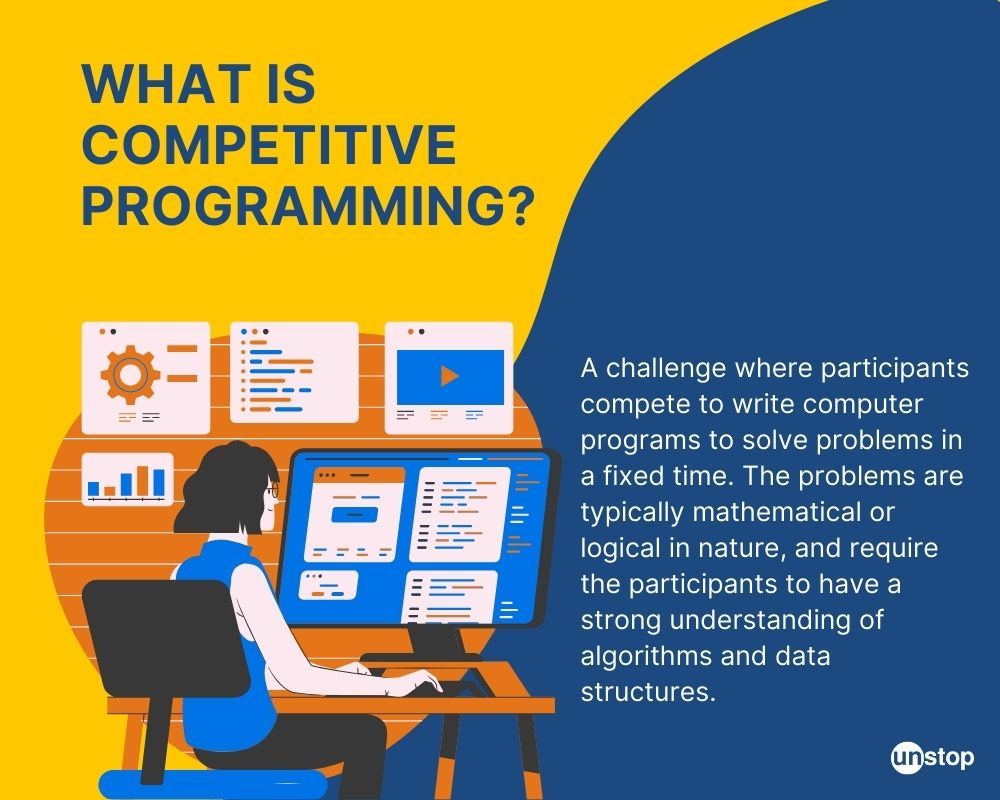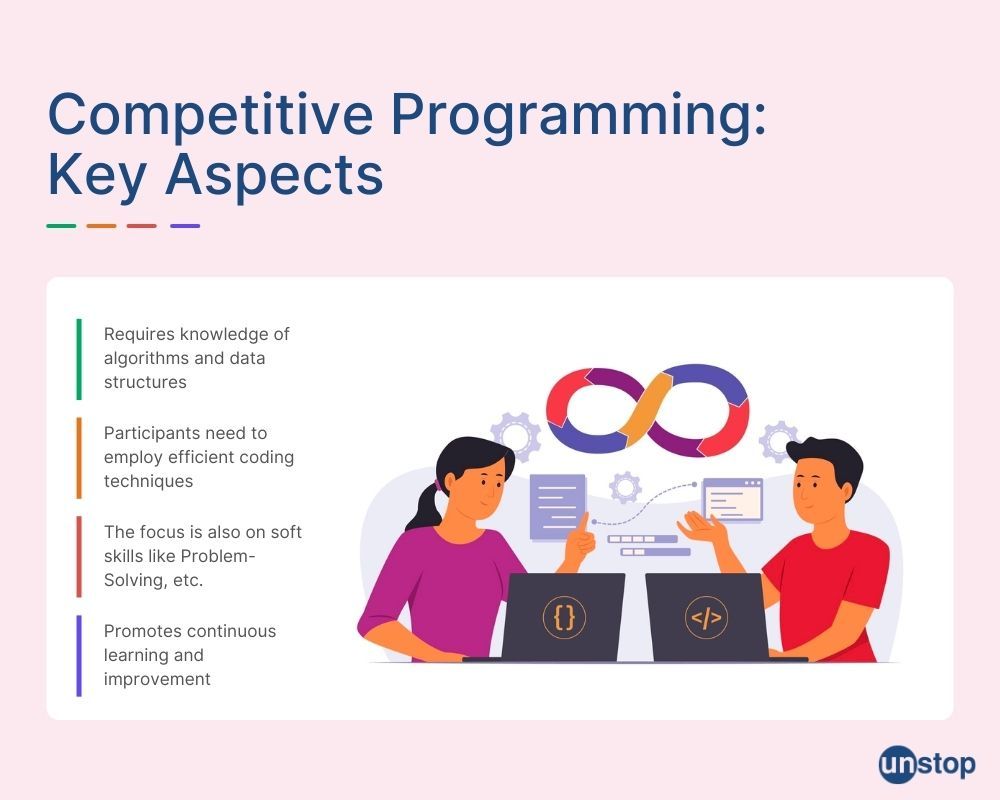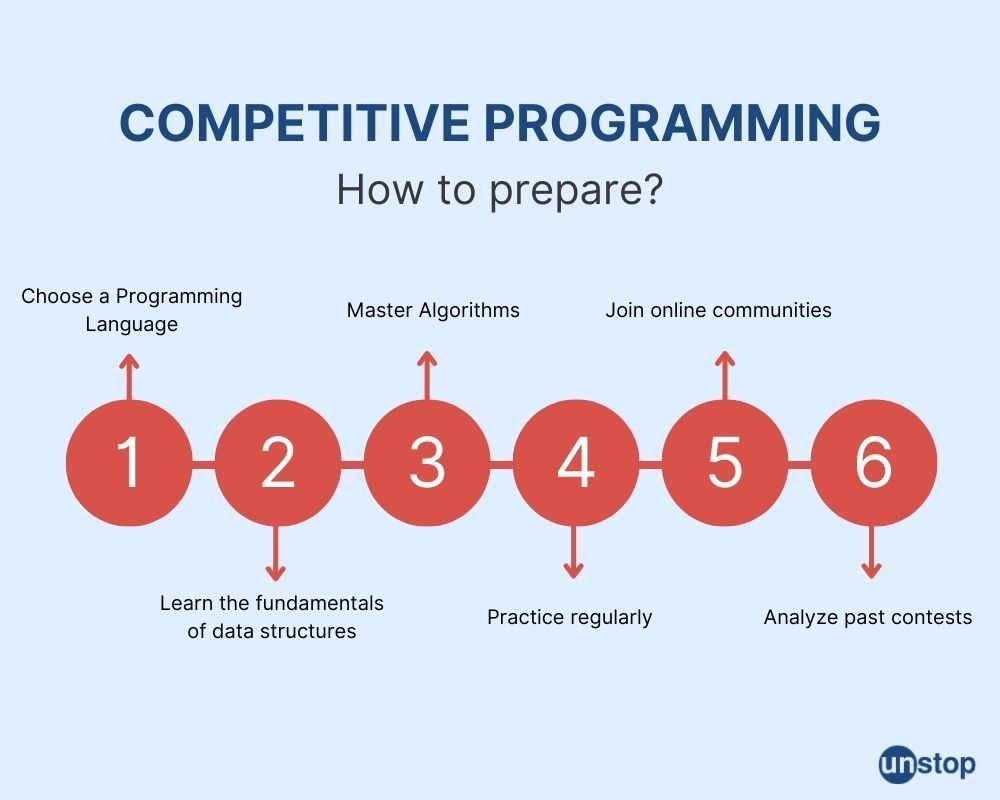- What is Competitive Programming?
- Features of Competitive Programming
- Benefits of Competitive Programming
- How to Prepare for Competitive Programming?
- Practicing Your Skills for Competitive Programming
- Entering Programming Competitions
- Frequently Asked Qustions (FAQs)
What Is Competitive Programming?: Your Guide To Acing This Sport

Competitive programming is a widely popular activity among programmers worldwide. It involves the art of solving algorithmic problems within a specified time limit. This challenging and intellectually stimulating pursuit not only helps individuals improve their problem-solving skills but also enhances their coding abilities.
For beginners starting their journey in competitive programming, understanding its fundamentals can be a daunting task. However, by embracing its challenges, individuals can experience significant growth in their coding proficiency and gain confidence in tackling complex problem-solving scenarios.
Several online platforms host competitive programming competitions and provide resources to help participants sharpen their skills. Whether you are looking for guidance on specific problem-solving techniques or seeking assistance with tricky coding questions, these platforms can help expand your knowledge and broaden your mindset.
Explore various competitive programming competitions, practice tools, and more at Unstop.
What is Competitive Programming?

Competitive programming, also known as "CP," is a coding sport where individuals compete against each other to solve complex problems using algorithms, data structures, and efficient coding techniques.
To excel in competitive programming, one must possess a solid understanding of various algorithms and data structures. These are tools in a programmer's toolbox that help them solve problems efficiently. Participants must be familiar with sorting, searching, graph theory, dynamic programming, and more.
Competitions in competitive programming can take place online or in person. Online platforms provide a virtual environment where participants worldwide can showcase their skills and compete for high scores. On the other hand, in-person competitions gather programmers together at a specific location for an adrenaline-filled challenge.
Features of Competitive Programming

Now that you know what is competitive programming, let’s take a look at the core aspects that make it so fascinating:
Knowledge of Algorithms and Data Structures
One of the key aspects of competitive programming is having a strong foundation in algorithms and data structures. Algorithms are step-by-step procedures used to solve specific problems or accomplish tasks. They act as blueprints for solving complex computational problems efficiently.
Remember, algorithms are different from flowcharts. Explore the differences here.
Data structures, on the other hand, are containers or formats used to organize and store data effectively. They determine how data is stored and accessed within a program. Understanding different data structures helps programmers optimize their code for speed and efficiency.
Efficient Coding Techniques
In competitive programming, time is of the essence. Thus, participants need to employ efficient coding techniques that minimize execution time and memory usage. Efficient coding practices involve writing clean code with minimal redundancy and utilizing appropriate algorithms for specific tasks. This ensures that programs run quickly, even when dealing with large datasets or complex computations.
Find important tips for excelling in competitive coding.
Focus on Soft Skills like Problem-Solving & Critical Thinking
Competitive programming tests not only technical skills but also the ability to think critically and solve problems under pressure. The goal is to evaluate if participants can come up with creative or out-of-the-box solutions. Simply put, while it may appear that competitive programming is all about developing your coding prowess, soft skills are just as important as technical skills.
Continuous Learning and Improvement
Competitive programming is a journey of continuous learning and improvement. As participants compete against skilled programmers from around the world, they gain exposure to different problem-solving techniques and innovative approaches.
Engaging in competitive programming challenges pushes individuals to constantly enhance their coding skills. They learn from their mistakes, analyze successful solutions from others, and apply new strategies in future competitions. This iterative process fosters personal growth and allows programmers to become more proficient over time.
Benefits of Competitive Programming
Competitive programming offers several benefits, such as:
Enhances Problem-Solving Abilities
One of the primary benefits of competitive programming is its ability to enhance problem-solving skills. Competitive programming challenges often require participants to think critically and come up with efficient solutions within a limited time frame. This constant practice hones their ability to analyze problems from different angles and devise optimal strategies for solving them. As a result, individuals become better equipped to approach real-world coding challenges with confidence and creativity.
Improves Coding Efficiency
Another significant advantage of competitive programming is its impact on coding efficiency. Through regular participation in coding competitions, individuals are exposed to various algorithms and data structures commonly used in the field of computer science. This exposure allows them to familiarize themselves with different techniques for optimizing code performance.
Competitive programmers often strive for speed and efficiency when solving problems. They learn how to write concise and elegant code that executes quickly while utilizing minimal resources. This emphasis on efficiency not only improves their overall coding skills but also instills good coding practices such as modularization and code reusability.
Note: The goal of competitive programming is to write programs that can be run quickly and compute the correct answer. Maintainability of code is not a core requirement as the code only needs to be readable during the contest. However, it’s ideal to maintain a bare minimum level of readability to track progress
Boosts Logical Thinking and Analytical Skills
Competitive programming is an excellent platform for developing logical thinking and analytical skills. The process of solving algorithmic problems requires individuals to think logically step-by-step, considering all possible scenarios and edge cases. This practice strengthens their ability to reason through complex situations systematically.
Moreover, competitive programming challenges often involve mathematical concepts or intricate logic puzzles that require careful analysis. By consistently engaging in such activities, individuals sharpen their analytical skills and become adept at identifying patterns, formulating hypotheses, and making logical deductions.
In addition to these benefits, competitive programming also fosters other essential skills such as time management, teamwork, and perseverance. Participants learn how to manage their time effectively during competitions, strategizing which problems to solve first and allocating appropriate time for each task. Collaboration with teammates in team-based competitions enhances their ability to work together towards a common goal.
How to Prepare for Competitive Programming?

To excel in competitive programming, you need to lay a solid foundation and sharpen your coding skills. Here are some essential steps to help you prepare:
Choose a Comfortable Programming Language
Start by selecting a programming language that you are comfortable with. Whether it's Python, Java, C++, or any other language, pick the one you have prior experience with. This familiarity will allow you to focus more on problem-solving rather than struggling with syntax.
Find the best programming languages to learn.
Learn the Fundamentals of Data Structures
Data structures are crucial for efficient problem-solving in competitive programming. Begin by understanding the basics of arrays, linked lists, stacks, and queues. Each data structure has its strengths and weaknesses, so make sure to grasp their characteristics and operations.
Once you have a good grasp of these basic data structures, move on to more advanced ones like trees, graphs, and heaps. Understanding how these data structures work and when to use them will greatly enhance your problem-solving abilities.
Master Algorithms
Algorithms serve as the building blocks of competitive programming. They provide efficient solutions to various computational problems. To become proficient in competitive programming, it's important to master key algorithms such as sorting algorithms (e.g., bubble sort, merge sort), searching algorithms (e.g., linear search, binary search), graph traversal algorithms (e.g., depth-first search, breadth-first search), and dynamic programming.
Take the time to understand the logic behind each algorithm and practice implementing them in your preferred programming language. With enough practice, you'll develop an intuition for choosing the right algorithm for a given problem.
Practice Regularly
Consistent practice is key. Set aside dedicated time each day or week to solve coding problems. Start with easier problems and gradually progress towards more challenging ones as your skills improve.
Working on real-world coding challenges will help you become familiar with different problem-solving techniques and improve your ability to think critically. Participating in coding contests will expose you to a competitive environment, allowing you to gauge your progress and learn from others.
Join Online Communities
Joining online communities and forums dedicated to competitive programming can provide valuable support and resources. Interacting with fellow programmers who share the same passion for problem-solving can be both motivating and educational.
These communities often have discussion boards where you can ask questions, seek guidance, or even participate in virtual coding competitions. Engaging with experienced programmers can give you insights into their strategies and approaches, helping you broaden your knowledge base.
Analyze Past Contests
To enhance your skills further, analyze past coding contests. Look at the solutions provided by top performers and try to understand their approach. Pay attention to the algorithms they used, the data structures they employed, and their overall problem-solving strategies.
By studying successful solutions from previous contests, you'll gain valuable insights into efficient coding practices and problem-solving techniques. This analysis will enable you to identify patterns and common pitfalls that can help guide your approach during future competitions.
Remember, competitive programming is not an overnight success story. It requires consistent effort, dedication, and perseverance.
Practicing Your Skills for Competitive Programming
To become proficient in competitive programming, it's crucial to dedicate time and effort to practicing your skills. Here are some effective strategies to help you improve your abilities and enhance your performance in competitions.
Solve Practice Problems
One of the best ways to sharpen your competitive programming skills is by solving practice problems from online platforms dedicated to this field. These platforms offer a wide range of problem sets with varying difficulty levels, allowing you to challenge yourself and learn new techniques along the way.
Participate in Virtual Contests
In addition to solving practice problems, participating in virtual contests is an excellent way to simulate real competition scenarios regularly. These contests provide a platform for you to put your skills to the test against other programmers from around the world. They typically involve solving a set of timed programming tasks within a specified period. Engaging in such contests helps you gauge your progress, identify areas for improvement, and build resilience under pressure.
Maintain Consistency
Consistency is key. Make it a habit to practice regularly rather than sporadically. Set aside dedicated time each day or week, specifically for practising coding challenges and participating in contests. By maintaining consistency, you'll gradually build up speed, accuracy, and problem-solving intuition.
Track Your Progress
Keeping track of your progress can be highly motivating as you see tangible improvements over time. Maintain a record or logbook where you note down the problems you've solved, the concepts you've mastered, and any breakthroughs or insights gained during practice sessions or competitions. This not only serves as a personal achievement tracker but also allows you to reflect on past challenges and learn from them.
Embrace Failures as Learning Opportunities
Competitive programming can be challenging at times, leading to feelings of frustration or disappointment when you encounter difficult problems or don't perform as well as expected. However, it's important to embrace failures as learning opportunities rather than letting them discourage you. Analyze your mistakes, understand the underlying concepts better, and seek guidance from experienced programmers or online communities. Remember that setbacks are a natural part of the learning process.
Collaborate and Learn from Others
Engaging with fellow competitive programmers can greatly enhance your learning experience. Joining online forums, discussion boards, or coding communities allows you to collaborate with like-minded individuals, share insights, and learn from others' approaches to problem-solving. Participating in coding competitions as a team can provide valuable exposure to different perspectives and strategies.
Set Goals and Challenge Yourself
Setting specific goals is essential for progress in any endeavor. In competitive programming, identify areas where you want to improve and set realistic targets for yourself. For example, aim to solve a certain number of challenging problems within a given time frame or strive to achieve a higher ranking in upcoming contests. By continuously challenging yourself and working towards these goals, you'll push your limits and steadily enhance your skills.
While practising regularly is crucial for improvement, it's equally important to take breaks and maintain a healthy work-life balance.
Entering Programming Competitions
If you've been honing your programming skills and want to take them to the next level, entering programming competitions is a great way to challenge yourself and showcase your abilities. There are various avenues you can explore to participate in these exciting events.
Join Online Coding Platforms
One option is to join online coding platforms that host regular competitions open to all skill levels. These platforms provide a space for programmers from around the world to compete against each other in coding challenges. By participating in these online competitions, you not only get the opportunity to solve interesting problems but also learn from others by analyzing their solutions. Many of these platforms rank participants based on their performance, allowing you to track your progress and compare yourself with other programmers.
Local and International Coding Contests
Another avenue is taking part in local or international coding contests organized by universities or companies. These contests often attract talented programmers who come together to solve complex problems within a specified time frame. Participating in such events allows you to test your skills against some of the best coders out there.
Local coding contests are usually held within your city or region, while international ones bring together contestants from different countries. These events not only offer an opportunity for personal growth but also provide a platform for networking with fellow programmers and industry professionals.
Team-Based Programming Competitions
If you enjoy collaborating with others while solving problems, team-based programming competitions might be right up your alley. In these contests, teams consisting of two or more members work together to tackle challenging coding problems within a given time limit.
Forming or joining a team can enhance the overall experience as it allows for brainstorming ideas, dividing tasks efficiently, and leveraging individual strengths. Team-based competitions foster teamwork skills while providing an environment conducive to learning from teammates' diverse approaches and problem-solving strategies.
The Thrill of Competition
Entering programming competitions is not just about showcasing your skills; it's also about the thrill of competition. These contests often feature intense rounds where contestants race against the clock to solve problems efficiently and accurately. The adrenaline rush that comes with competing against other talented programmers can be exhilarating and addictive.
Moreover, participating in programming competitions gives you the chance to win exciting prizes. Many contests offer cash rewards, scholarships, internships, or even job opportunities for top performers. These incentives serve as additional motivation to push yourself further and excel in your coding abilities.
In conclusion, if you are passionate about coding and enjoy solving challenging problems, competitive programming offers a platform for continuous improvement. Embrace this journey by exploring online resources, joining coding communities, and actively participating in contests.
Frequently Asked Questions (FAQs)
1. What is competitive programming?
Competitive programming refers to a mind-bending sport where participants solve algorithmic problems within a given time frame. It's like an intellectual battle, testing your coding skills and problem-solving abilities.
2. Why should I get into competitive programming?
Getting into competitive programming can be incredibly beneficial. It sharpens your logical thinking, improves your coding efficiency, and enhances your problem-solving skills. Plus, it's a fantastic way to challenge yourself and showcase your talent in the coding community.
3. How can I start with competitive programming?
To kickstart your journey in competitive programming, start by learning a programming language of your choice. Then dive into algorithms and data structures. Practice solving problems on platforms like Codeforces, Topcoder, or LeetCode. Join online communities or participate in contests to gain experience and learn from others.
4. Is competitive programming only for experts?
No! Competitive programming is open to everyone who loves coding and wants to improve their skills. You don't have to be an expert programmer to get started. With consistent practice and dedication, even beginners can become proficient in this exciting field.
5. Can competitive programming help me land a job?
Absolutely! Competitive programming not only hones your technical skills but also impresses potential employers. Many companies value candidates with strong problem-solving abilities, which are developed through competitive programming. So, participating in competitions and showcasing your achievements can give you an edge during job interviews.
5. Where can I find resources for learning competitive programming?
There are numerous resources available online that can help you learn competitive programming effectively. Many websites offer courses specifically designed for this purpose. Books such as "Competitive Programming" by Steven Halim are highly recommended for comprehensive learning.
Remember that success in competitive programming requires dedication, perseverance, and a willingness to learn from both successes and failures constantly.
You may also be interested in the following:
- Software testing: Know the difference between alpha and beta testing.
- What are the unique advantages of an OOP paradigm?
- A quick brush-up on the advantages and disadvantages of Linked Lists.
- Basics of web development: Advantages and disadvantages of HTML.
- Advantages And Disadvantages Of Computer Network Explained!
I’m a reader first and a writer second, constantly diving into the world of content. If I’m not writing or reading, I like watching movies and dreaming of a life by the beach.
Login to continue reading
And access exclusive content, personalized recommendations, and career-boosting opportunities.
Subscribe
to our newsletter














Comments
Add comment